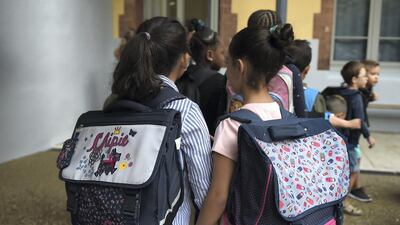Beneath the glare of television cameras, primary pupils shook their heads sadly when government ministers and reporters wanted to know whether they had eaten breakfast before school.
“Why are there no biscuits or cereal in the cupboard at home?” one little girl was asked. “Because my mum has no money,” she replied.
Far worse examples of poverty can be found around the world. But these exchanges took place in a school in France, which has the world’s seventh biggest economy and the third largest in the European Union behind only Germany and the UK.
Amid a national sense of shame that up to a million French children often start classes on empty stomachs, the president Emmanuel Macron has been spurred into action and announced a programme of free breakfasts in poorer areas.
"It does not yet go far enough but is a welcome start," Jean-Luc Ginder, an economist and campaigner who lobbied the president before he launched a major initiative to combat poverty, told The National.
“I do not pretend my letters to Mr Macron influenced him. But the fact that he is listening is encouraging. It is a problem of the greatest importance and we must overcome it.”
The inability of families to make ends meet lies at the heart of the Gilets Jaunes or yellow vest protest movement that only now, after six months of routine disruption, destruction and violence, seem to be fizzling out in spite of 26 consecutive weekend protests.
Unemployment rates are high – around nine per cent generally, 20 per cent among the under-25s – and salaries for those with jobs are often low, failing to keep pace with the rising cost of basic needs.
"Everything for Notre-Dame, nothing for Les Miserables," read banners, evoking two of Victor Hugo's classic novels, at a Gilets Jaunes demonstration after last month's devastating fire at the Paris cathedral.
One child in five in France is classed as poor by the French pressure group L’Observatoire des inégalités which roughly translates as Inequality Watch, the name of the European network to which it belongs.
That means three million children are considered to be living in deprived conditions, with one in three going to school hungry at least once a week.
The association also calculates that the total number of poor people in France rose by 630,000 between 2006 and 2016 to reach five million.
In a petition to the president and parliamentarians, Mr Ginder said the issue touched “the soul of France” and that eliminating hunger was crucial to achieving social harmony.
“Poverty and deprivation are too often the principal cause of anxiety even though France has enough food to ensure everyone can eat,” he wrote. “The earth is a generous mother. She can provide, in abundance, for all her children provided her soil is cultivated in fairness.”
The language may be flowery and the statistics open to challenge but the principle is not lost on Mr Macron.
The former investment banker is accused by opponents, among them the yellow-vest protesters, of being a president for the rich, providing tax cuts for the better-off but austerity measures for lower-income groups.
But even before the unrest began last November, the president was anxious to show incentives for the wealthy, whose investment and entrepreneurial flair he sees as essential to boosting the French economy, need not be incompatible with help for the disadvantaged.
Two months earlier, he launched an anti-poverty action plan that will cost the state €8bn (Dh33bn) over four years.
The initiative to provide free breakfast in schools attended by children from poorer homes and cut-price lunches in school canteens are among the eye-catching elements of his proposals.
A pilot scheme for free breakfasts began last month, covering schools in “priority” areas in eight of France’s 30 academies (regional educational divisions). It will be extended to the country as a whole from September at a cost of €12m (Dh49.5m) a year.
Provincial mayors have complained that their councils will still have to meet part of the cost, threatening other local services. But Mr Ginder described their objection as a “pretext”, implying opposition on political grounds.
Christelle Dubos, a junior health minister who has put the number of children arriving unfed at school at one in 10, insists the initiative is vital. “Such a child does not have the same learning opportunities as a classmate who starts the day on a full stomach,” she said last month.
Accompanying his government colleague on a visit to the Jean-Rostand school in Pont-Sainte-Maxence, northern France, the education minister Jean-Michel Blanquer said: “We decided something had to be done. It is not to remove responsibility from the families but to make everyone responsible.”

